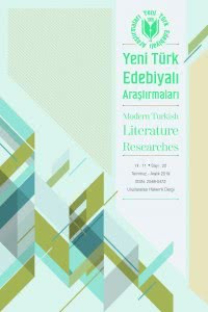İHSAN OKTAY ANAR’IN SUSKUNLAR ADLI ROMANINDA SEVGİNİN YAPISÖKÜCÜ GÜCÜ
İhsan Oktay Anar, beşinci romanı Suskunlar’da (2007), şiddetin toplumsal nedenlerini irdeler ve kitabın kurgusunu tarihî bir çerçeveye oturtarak, şiddetin ana sebebinin belli bir anlayıştan kaynaklandığının ve bu anlayışın da sadece Osmanlı döneminde görül- mediğinin, bugün de hâlâ varlığını sürdürdüğünün altını çizer. Anar, eski Yunan filozof Platon’un idealist felsefesini, çağdaş Fransız felsefeci Jacques Derrida’nın logosentrizm eleştirisi çerçevesi içinde ele alarak Platonik felsefeye eleştirel bir yorum katar. Derri- da’ya göre Batı felsefesi Platon’dan beri hep logosentrik bir yapıya sahip olmuştur: Lo- gosentrik düşünce ikili zıtlıklar üzerine kurulan düalist bir sistem inşa etmiştir ve sonuç olarak da hiyerarşi ve eşitsizliğe sebep olmuştur. Anar da, Suskunlar’da bu hiyerarşik düşünce sisteminden, içinde şefkat ve alçakgönüllülüğü barındıran sevgiyi besleyerek çıkılabildiğini öne sürer, çünkü ancak sevgi bu ayrımcı tutumu aşıp, insanları tekrar birleşme yoluna götürebilir. Romanda logosentrik düşüncenin eleştirilmesinin başlıca nedenlerinden biri de, bu düşüncenin başkalarının ötekileştirilmesine sebep olmasıdır. Egemen sistemin altyapısını sağlayan logosentrik düşünce, otoriteyi logosun simgesi hâline getirerek, otoriter ofsisteme karşı itaat bekler ve düzene uyan herkesi ‘bizden’ olarak değerlendirken, uymayanları da dışlayarak onları ‘bizden olmayan’ ötekiler ha- line getirir. Suskunlar, logosentrik düşüncenin bu ayrıştırıcı ve düalist niteliğine karşın sevgi ve şefkatin gücünü vurgular, çünkü sevgi ayrıştırmak yerine birleştirir. Sonuç ola- rak da roman ikili zıtlıkların hâkim olduğu düalizmi bozarak, bu düşünce sisteminin altında yatan şiddet ve ikiyüzlülüğe karşı çıkar.
Anahtar Kelimeler:
İhsan Oktay Anar, Suskunlar, logosentrizm, yapısökümü, sevgi
THE DECONSTRUCTIVE POWER OF LOVE IN IHSAN OKTAY ANAR’S SUSKUNLAR
İhsan Oktay Anar’s fifth novel Suskunlar (2007) explores the social causes of vi- olence and underscores how a certain form of violence has been persisting throughout history, because its roots lie in a certain way of thinking that has not only prevailed during the Ottoman period, but is still visible today. In this novel Anar views Platonic philosophy through the critique of French philosopher Jacques Derrida’s concept of logocentrism, as Derrida claims that logocentrism has a long history in Western philosophy and goes back to Plato and beyond. The major reason for the critique of logocentrism lies in the fact that this system of thought relies on a dualist way of thinking that is hierarchical and leads to the marginalisation of those who do not fit into the superior pair of binary opposites. In Suskunlar, Anar underscores the deconstructive power of a form of love that combines compassion and humility, because only such a kind of love can break the boundaries of opposites and recombine what has been separated. Doing so Anar underscores society’s underlying violence and hypocrisy.
Keywords:
İhsan Oktay Anar, Suskunlar, logocentrism, deconstruction, love.,
___
- Almond, Ian (2004). Sufism and Deconstruction: A Comparative Study of Derrida and Ibn ‘Arabi. London: Routledge. Anar, İhsan Oktay (2007). Suskunlar. İstanbul: İletişim.
- Bloch, Ernst (2019). Avicenna and the Aristotelian Left. New York: Colombia UP.
- Derrida, Jacques (1981). Dissemination. London: The Athlone Press.
- Derrida, Jacques (1997). Of Grammatology. Baltimore: Johns Hopkins UP.
- Derrida, Jacques (2002). Writing and Difference. London: Routledge. Ecevit, Yıldız (2004). Türk Romanında Postmodernist Açılımlar. İstanbul: İletişim.
- Ergun, Zeynep (2009). Erkeğin Yittiği Yerde. İstanbul: Everest.
- Gilligan, Carol; David, A.J (2008). The Deepening Darkness: Patriarchy, Resistance, and Democracy’s Future. Cambridge: Cambridge UP.
- Hatipoğlu, Sibel (2010). “Eşikte Parlayan İnci ve İlahi Sırrı Fısıldayan Ney ya da Pinhan ve Suskunlar’da Tasavvuf”, Turkish Studies. 5(4): 1224-1253.
- Koçakoğlu, Ahmet (2010). Yerli Bir Postmodern: İhsan Oktay Anar. Konya: Palet.
- Korat, Gürsel (2011). “Minyatür ve Roman Estetiği”, Notos. 5: 23- 25.
- Norris, Christopher (2007). “Metaphysics”, Understanding Derrida. Ed. Jack Reynolds vd. London: Continuum.
- Plato (2008). The Symposium. Cambridge: Cambridge UP.
- Royle, Nicholas (2003). Jacques Derrida. London: Routledge.
- Rubenstein, Richard E (2004). Aristotle’s Children: How Christians, Muslims, and Jews Rediscovered Ancient Wisdom and Illuminated the Middle Ages. Orlando: Harcourt.
- Rumi, Jalaluddin (1999). Signs of the Unseen: The Discourses of Jalaluddin Rumi. Boston: Shambhala.
- Schimmel, Annemarie (2001). Rumi’s World: the Life and Work of the Great Sufi Poet. Boston: Shambhala.
- Seyhan, Azade (2014). Dünya Edebiyatı Bağlamında Modern Türk Romanı: Kesişen Yazgıların Hikayesi. İstanbul: İletişim.
- ISSN: 1308-8203
- Yayın Aralığı: Yılda 2 Sayı
- Başlangıç: 2009
- Yayıncı: Türk Edebiyatı Vakfı
Sayıdaki Diğer Makaleler
GILGAMIŞ MİTİNİN YAPISÖKÜMÜ: ZEYNEP AVCI’NIN GILGAMIŞ ADLI OYUNU
MUSTAFA KUTLU’NUN TAHİR SAMİ BEY’İN ÖZEL HAYATIHİKÂYESİNİN METİNSEL ARKA PLANI
TARİH-İDEOLOJİ-KURMACA BAĞLAMINDA ŞEYH BEDREDDİN
İHSAN OKTAY ANAR’IN SUSKUNLAR ADLI ROMANINDA SEVGİNİN YAPISÖKÜCÜ GÜCÜ
MODERNLİĞİN NOSTALJİCİ TUTUMU: YAHYA KEMAL ŞİİRİ
AHMET MİTHAT EFENDİ JÖN TÜRK ROMANINI NEDEN YAZDI?
İKİNCİ DÜNYA SAVAŞINDA TÜRK-İTALYAN İLİŞKİLERİNİN TÜRK ŞİİRİNE YANSIMASI
